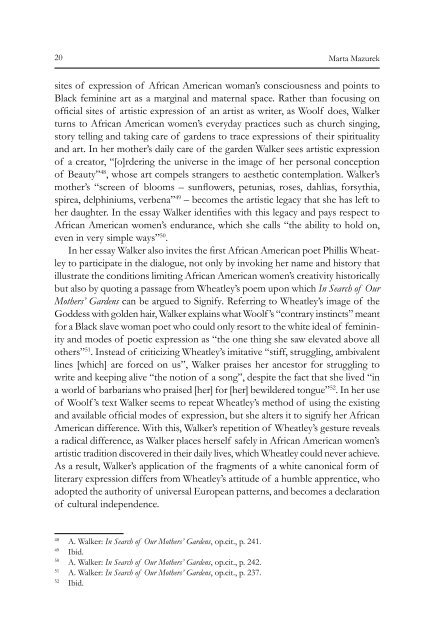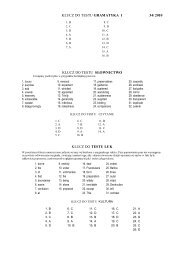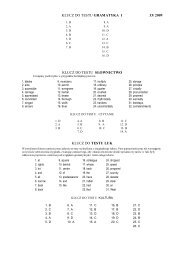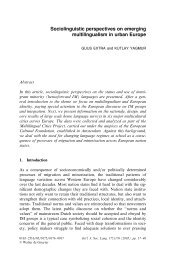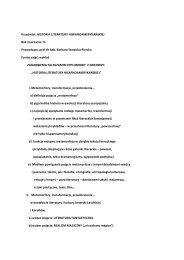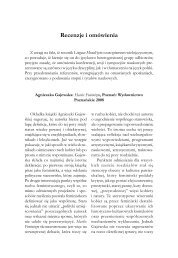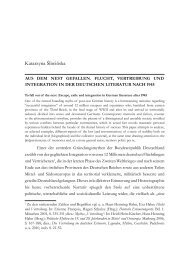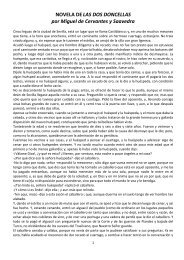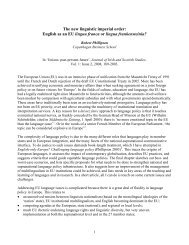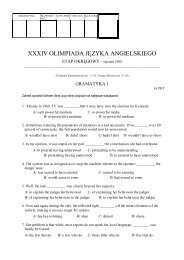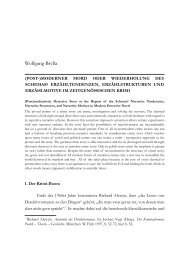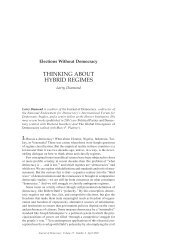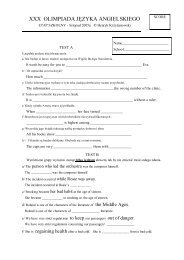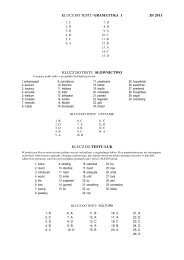African American women and feminism: Alice Walker's womanism ...
African American women and feminism: Alice Walker's womanism ...
African American women and feminism: Alice Walker's womanism ...
You also want an ePaper? Increase the reach of your titles
YUMPU automatically turns print PDFs into web optimized ePapers that Google loves.
20 Marta Mazurek<br />
sites of expression of <strong>African</strong> <strong>American</strong> woman’s consciousness <strong>and</strong> points to<br />
Black feminine art as a marginal <strong>and</strong> maternal space. Rather than focusing on<br />
official sites of artistic expression of an artist as writer, as Woolf does, Walker<br />
turns to <strong>African</strong> <strong>American</strong> <strong>women</strong>’s everyday practices such as church singing,<br />
story telling <strong>and</strong> taking care of gardens to trace expressions of their spirituality<br />
<strong>and</strong> art. In her mother’s daily care of the garden Walker sees artistic expression<br />
of a creator, “[o]rdering the universe in the image of her personal conception<br />
of Beauty” 48 , whose art compels strangers to aesthetic contemplation. Walker’s<br />
mother’s “screen of blooms – sunflowers, petunias, roses, dahlias, forsythia,<br />
spirea, delphiniums, verbena” 49 – becomes the artistic legacy that she has left to<br />
her daughter. In the essay Walker identifies with this legacy <strong>and</strong> pays respect to<br />
<strong>African</strong> <strong>American</strong> <strong>women</strong>’s endurance, which she calls “the ability to hold on,<br />
even in very simple ways” 50 .<br />
In her essay Walker also invites the first <strong>African</strong> <strong>American</strong> poet Phillis Wheatley<br />
to participate in the dialogue, not only by invoking her name <strong>and</strong> history that<br />
illustrate the conditions limiting <strong>African</strong> <strong>American</strong> <strong>women</strong>’s creativity historically<br />
but also by quoting a passage from Wheatley’s poem upon which In Search of Our<br />
Mothers’ Gardens can be argued to Signify. Referring to Wheatley’s image of the<br />
Goddess with golden hair, Walker explains what Woolf’s “contrary instincts” meant<br />
for a Black slave woman poet who could only resort to the white ideal of femininity<br />
<strong>and</strong> modes of poetic expression as “the one thing she saw elevated above all<br />
others” 51 . Instead of criticizing Wheatley’s imitative “stiff, struggling, ambivalent<br />
lines [which] are forced on us”, Walker praises her ancestor for struggling to<br />
write <strong>and</strong> keeping alive “the notion of a song”, despite the fact that she lived “in<br />
a world of barbarians who praised [her] for [her] bewildered tongue” 52 . In her use<br />
of Woolf ’s text Walker seems to repeat Wheatley’s method of using the existing<br />
<strong>and</strong> available official modes of expression, but she alters it to signify her <strong>African</strong><br />
<strong>American</strong> difference. With this, Walker’s repetition of Wheatley’s gesture reveals<br />
a radical difference, as Walker places herself safely in <strong>African</strong> <strong>American</strong> <strong>women</strong>’s<br />
artistic tradition discovered in their daily lives, which Wheatley could never achieve.<br />
As a result, Walker’s application of the fragments of a white canonical form of<br />
literary expression differs from Wheatley’s attitude of a humble apprentice, who<br />
adopted the authority of universal European patterns, <strong>and</strong> becomes a declaration<br />
of cultural independence.<br />
48<br />
A. Walker: In Search of Our Mothers’ Gardens, op.cit., p. 241.<br />
49<br />
Ibid.<br />
50<br />
A. Walker: In Search of Our Mothers’ Gardens, op.cit., p. 242.<br />
51<br />
A. Walker: In Search of Our Mothers’ Gardens, op.cit., p. 237.<br />
52<br />
Ibid.


